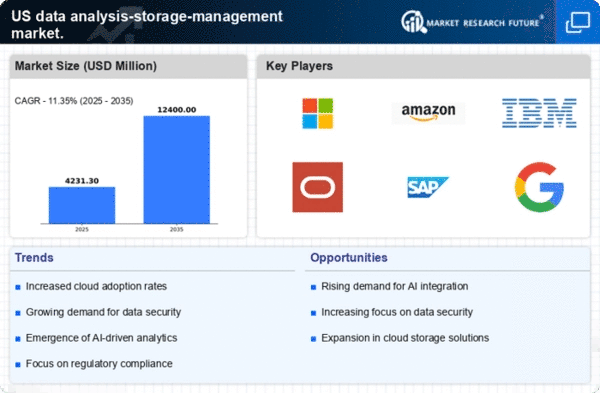Expansion of Big Data Technologies
The proliferation of big data technologies significantly influences the data analysis-storage-management market. With the volume of data generated daily reaching unprecedented levels, organizations are compelled to adopt robust storage solutions capable of handling vast datasets. The market for big data analytics is expected to exceed $200 billion by 2026, which indicates a strong growth trajectory. This expansion necessitates the integration of advanced storage management systems that can efficiently process and analyze large volumes of data. Consequently, the data analysis-storage-management market evolves to accommodate these requirements, driving technological advancements and enhancing service offerings.
Increased Focus on Data Governance
Data governance emerges as a critical driver in the data analysis-storage-management market. Organizations recognize the importance of establishing frameworks to manage data integrity, security, and compliance. As regulatory requirements become more stringent, businesses invest in storage solutions that facilitate effective data governance. The market for data governance tools is projected to grow by over 25% in the coming years, reflecting the heightened emphasis on data management practices. This trend compels storage providers to enhance their offerings, ensuring alignment with governance standards and fostering trust among stakeholders in the data analysis-storage-management market.
Emergence of Hybrid Storage Architectures
The emergence of hybrid storage architectures significantly impacts the data analysis-storage-management market. Organizations are increasingly adopting hybrid models that combine on-premises and cloud storage solutions to optimize performance and cost-efficiency. This approach allows businesses to leverage the benefits of both environments, ensuring data accessibility and security. The hybrid storage market is projected to grow by over 15% annually, indicating a shift in storage strategies. As companies seek to balance flexibility and control, the data analysis-storage-management market adapts to support these hybrid architectures, fostering innovation and collaboration among service providers.
Growing Need for Scalable Storage Solutions
The demand for scalable storage solutions is a prominent driver in the data analysis-storage-management market. As organizations expand their operations and data requirements increase, the need for flexible storage options becomes paramount. Companies are increasingly seeking solutions that can grow alongside their data needs without incurring excessive costs. The market for scalable storage solutions is anticipated to witness a growth rate of approximately 20% annually. This trend encourages storage providers to innovate and develop solutions that offer seamless scalability, thereby enhancing their competitiveness in the data analysis-storage-management market.
Rising Demand for Real-Time Data Processing
The data analysis-storage-management market is experiencing a notable surge in demand for real-time data processing capabilities. Organizations increasingly require immediate insights to make informed decisions, driving investments in advanced storage solutions. According to recent estimates, the market for real-time analytics is projected to grow at a CAGR of approximately 30% over the next five years. This trend compels storage providers to enhance their offerings, ensuring compatibility with real-time data processing tools. As businesses strive for agility and responsiveness, the data analysis-storage-management market adapts to meet these evolving needs, fostering innovation and competition among service providers.
















